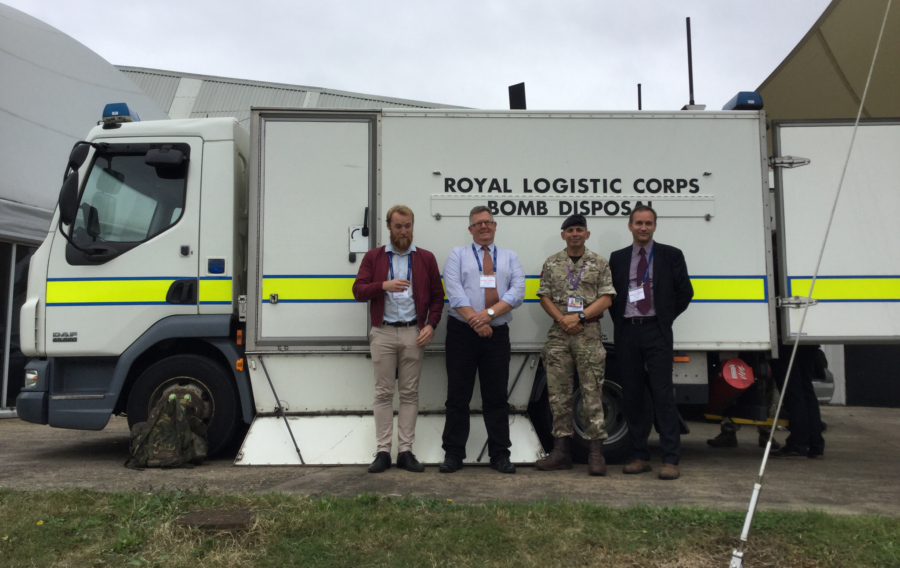
Think ‘defence vehicles’ and most of us will picture tanks on operations overseas, but equally vital are the vehicles used to help maintain UK homeland security. With some of these vehicles now undergoing an upgrade under Project GASKET, MOD DCB features editor Julie Shennan examines the opportunities this will bring to the UK supply chain.
Project GASKET is the name given to the Ministry of Defence’s upgrade of its counter chemical, biological, radiological, nuclear and explosive (CBRNE) fleet of vehicles. The project is split into four phases with two delivery teams, opportunities from £20 million to £100 million in value and a focus on Commercial off the Shelf (COTS) procurement.
Phases 1 and 2 are under way with the Operational Support Vehicles Programme (OSVP) Team and will likely utilise PHOENIX 2 or Crown Commercial Service arrangements to secure vehicles such as staff cars, vans and off-road 4x4s; these vehicles will be fitted with additional items of equipment such as special to role racking, communications systems and blue lights.
Projects 3 and 4 are also proceeding through the Special Projects Search & Countermeasures (SPSCM) Project Team. Its requirement is to integrate some of the base systems required in Projects 1 and 2, together with a focus on the more complex integration of electrical / electronic sub-systems into Logistics Support platforms for more specialist roles. The additional challenge of vehicle selection, design, testing and post-delivery in-service support is focused towards a Prime Contractor approach.
The opening two phases will require the procurement of around 175 vehicles while the final two phases will require around 100-125 vehicles; the whole GASKET fleet will hence number around a maximum of 300 vehicles, all with integrated sub-systems.
Across the whole GASKET project, vehicles will be acquired by DE&S as standard commercial platforms and modified to fit the requirement. Selection will be based on a range of criteria, including their ability to operate across all terrains and in all weather conditions anywhere in the UK on a 24/7 basis.
GASKET Assistant Team Leader, Lt Col Brandon Wellard (SPSCM), commented: “We do not want bespoke military vehicles per se, but something that is fit for purpose onto which we can integrate existing mission systems.”
He added: “We have to be sure that whatever the vehicle type is it can operate across all terrains and in all weather conditions.”
GASKET Project Manager Marc Norvill said: “Projects 3 and 4 cover vehicles of a similar role that are geographically dispersed between the UK mainland and Northern Ireland. As such, they are being considered as a single project and our plan is to deliver these capabilities collectively.”
Six suppliers have been down-selected for Projects 3 and 4 – Babcock, General Dynamics, Jankel, Marshall, QinetiQ and Thales. SPSCM intends to host a Requirements Day before the end of 2016, in order to provide the supply chain with more information on potential sub-contracting opportunities and DE&S aspirations for the projects.
These opportunities will only be fully realised once a single Prime Contractor is chosen following the Invitation to Negotiate (ITN) in the first quarter of 2017. Then, in 2018, the project will progress towards Main Gate. Finally, the fleet will move into service in 2019, with an expected lifespan of ten years.
Throughout the lifespan of Project GASKET the aim is for the Prime Contractor to manage and support the fleet.
Mr Norvill explained: “The Prime Contractor will be required to select the right vehicles and conduct all design, manufacture, integration and test activities with a direct input from the user community in order to ensure operational effectiveness is designed-in.
“Once in-service, the Prime will be responsible for supporting the system through life, a solution that has to be an improvement on the old-school approach where one team buys the vehicles, another does the conversion and then both support their relative system areas with confusion often arising as to where boundaries lie.”
This single point of contact should not only reduce procurement costs, but also make it easier for the end users to get support and advice about the vehicles when needed.
Another way in which Project GASKET aims to provide a more user-friendly fleet is through smarter integration of equipment into vehicle interiors.
Mr Norvill said: “Often when we work with defence suppliers the external technology is great, but the integration of the interior is not very slick and vehicles often look like one-off projects.
“We have seen what is available in the commercial sector and know that their vehicle interiors are well fitted, robust and can stand the test of time; so we would like the defence industry to team up with the commercial sector to give us this more polished solution.”
While upgrading the interior of a vehicle might not sound vital, it is when it comes to enabling quick access to life-saving equipment.
Lt Col Wellard said: “There are lots of great ideas out there to do with training, safety measures and racking; so we want to get some of this commercially effective technology and incorporate it into our vehicles.”
This technology will also work to improve the effectiveness of the fleet, as Mr Norvill explained.
He said: “What we are also looking for is lower through-life costs and essentially to make sure the vehicle system is of a good reliability standard, improving the service intervals and miles per gallon.
“This will ensure the new system is more economically viable and reliable than the current system.”
For more information, email GASKET Project Media Lead Justin Andrews at DESLESTSP-SPSCM-4b1@mod.uk
If you would like to join our community and read more articles like this then please click here








